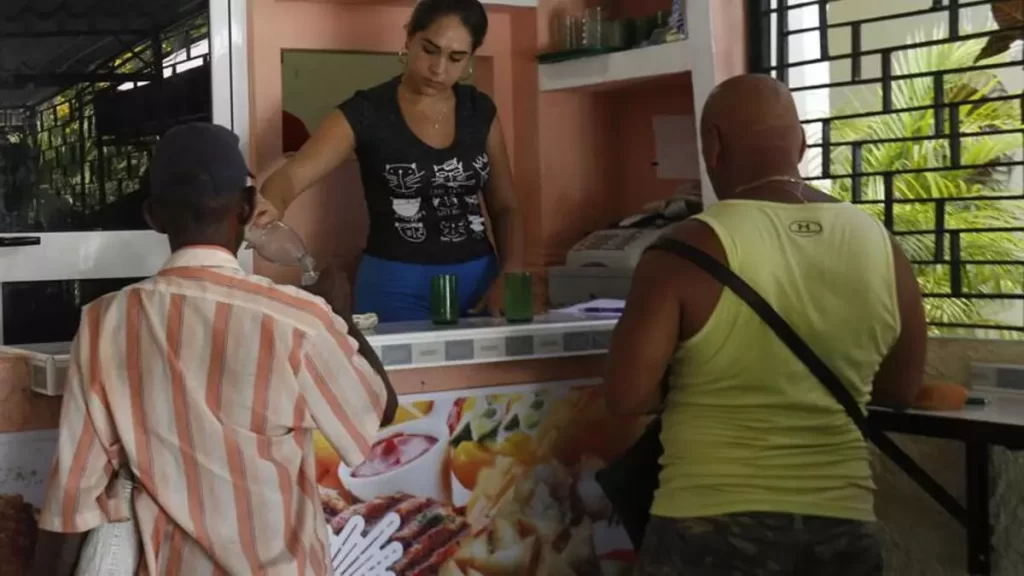“The sad thing is, with the country the way it is now, we won’t even feel homesick.”

![]() 14ymedio, Julio César Contreras, Cienfuegos, July 24, 2024 — Amelia’s diploma from the Cienfuegos School of Medical Sciences has been hanging in her living room for exactly three years. That is about how long she has known that this was not a degree she would be using. Like many of her classmates, the 26-year-old fulfilled her social service obligations after graduation and now works as a waitress in a privately owned restaurant.
14ymedio, Julio César Contreras, Cienfuegos, July 24, 2024 — Amelia’s diploma from the Cienfuegos School of Medical Sciences has been hanging in her living room for exactly three years. That is about how long she has known that this was not a degree she would be using. Like many of her classmates, the 26-year-old fulfilled her social service obligations after graduation and now works as a waitress in a privately owned restaurant.
“All the while I was studying, I thought that a degree — even with all the problems like the teacher shortage and the outdated subject matter — would lead to a better future. But as soon as entered the real world, I was disappointed,” Amelia explains. At the end of her sixth year, her academic credentials should have landed her in one of the top spots for job placement. However, because of so-called “comprehensiveness” considerations — these take into account overall student performance, including participation in political events — many classmates with lower grades ended up with better jobs.
“I did manage, just barely, to land a job at the provincial hospital but ultimately I couldn’t handle the 24-hour shifts. Conditions were such that I had trouble eating, sleeping and bathing,” she recalls. Her salary was also not what she had expected. “I got the basic 4,200 pesos plus a little extra for working at night. The most I earned in one month was 7,000 pesos but it lasted only 15 days and I was exhausted from the daily grind. I’m not passionate about what I’m doing now but I earn almost twice as much,” she says.
Amelia earns 500 pesos a day working at a restaurant six days a week from 8:30 AM till 4:30 PM
Amelia earns 500 pesos a day working at a restaurant, Monday through Saturday, from 8:30 AM till 4:30 PM. That comes to 12,000 a month plus tips. “It’s still not much money but it allows me to both save and survive,” says Amelia, who is putting money aside for the same reason that she has never tried to specialize in a particular medical field. “I want to leave the country and, if I tried to get into surgery — which is what I would like to do — or something else, they would control me.”
Amelia’s sister Anet also works in a private-sector job. She got her chemical engineering degree five years ago but, like her sister, had to take a job with a privately owned business that sells wooden toys and other items. “As soon as I graduated, I was sent to a high school to teach contemporary history. I had studied chemical substances and processes but every day I had to talk about the October Revolution or the Second World War because there was a shortage of teachers,” she explains.
She did not dislike the job and stayed at the school for several year but had to quit once Covid hit. “Prices shot up, basic products disappeared and, by then, I had a very young son. I couldn’t stay at a place that paid me next to nothing,” she says.
Anet went through several private-sector jobs until a year ago when a friend, a business owner, suggested she sell her merchandise at the crafts fair
Anet went through several private-sector jobs until a year ago when a friend, a business owner, suggested she sell her merchandise at the crafts fair in the capital city. “They pay me well and the work is low-stress. It gives me time to do other things,” she adds.
A few months ago, Anet’s husband was approved for the US Humanitarian Parole Program. They both decided that he should go to the United States with their son while she stayed behind and waited her turn. I am happy because my son is with his dad but it was a very tough decision to make,” she says.
Anet bemoans the hardships that lead Cubans, especially young Cubans, to leave the country in search of a better life. And her case, she warns, is not even the worst. “I have classmates who managed to get scholarships in Germany or Chile and had to leave their families behind. It will take them years to get their children and partners out. At least I’ve already completed the paperwork and just have to wait for the answer.”
Engineers, doctors, intellectuals. . . the island’s list of professionals keeps getting shorter. “It’s a full-on brain drain. Almost everyone who studied with me and my sister now lives abroad,” says Anet. “Some will come back and apply what they learned but most of us will look for other ways to earn a living and have a decent life. The sad thing is, with the country the way it is now, we won’t even feel homesick.”
____________
COLLABORATE WITH OUR WORK: The 14ymedio team is committed to practicing serious journalism that reflects Cuba’s reality in all its depth. Thank you for joining us on this long journey. We invite you to continue supporting us by becoming a member of 14ymedio now. Together we can continue transforming journalism in Cuba.
